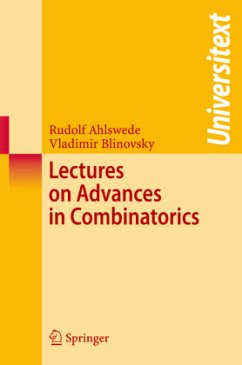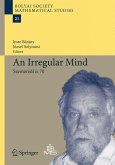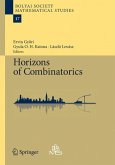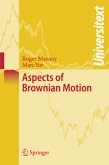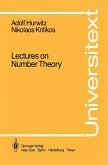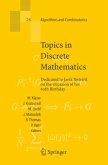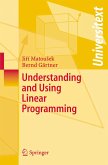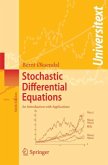This volume features lectures that focus on basis extremal problems and inequalities--two sides of the same coin. Additionally, the lectures help prepare approaches and methods useful and applicable in a broader mathematical context.
The lectures concentrate on highlights in Combinatorial (ChaptersII and III) and Number Theoretical (ChapterIV) Extremal Theory, in particular on the solution of famous problems which were open for many decades. However, the organization of the lectures in six chapters does neither follow the historic developments nor the connections between ideas in several cases. With the speci?ed auxiliary results in ChapterI on Probability Theory, Graph Theory, etc., all chapters can be read and taught independently of one another. In addition to the 16 lectures organized in 6 chapters of the main part of the book, there is supplementary material for most of them in the Appendix. In parti- lar, there are applications and further exercises, research problems, conjectures, and even research programs. The following books and reports [B97], [ACDKPSWZ00], [A01], and [ABCABDM06], mostly of the authors, are frequently cited in this book, especially in the Appendix, and we therefore mark them by short labels as [B], [N], [E], and [G]. We emphasize that there are also "Exercises" in [B], a "Problem Section" with contributions by several authors on pages 1063-1105 of [G], which are often of a combinatorial nature, and "Problems and Conjectures" on pages 172-173 of [E].
The lectures concentrate on highlights in Combinatorial (ChaptersII and III) and Number Theoretical (ChapterIV) Extremal Theory, in particular on the solution of famous problems which were open for many decades. However, the organization of the lectures in six chapters does neither follow the historic developments nor the connections between ideas in several cases. With the speci?ed auxiliary results in ChapterI on Probability Theory, Graph Theory, etc., all chapters can be read and taught independently of one another. In addition to the 16 lectures organized in 6 chapters of the main part of the book, there is supplementary material for most of them in the Appendix. In parti- lar, there are applications and further exercises, research problems, conjectures, and even research programs. The following books and reports [B97], [ACDKPSWZ00], [A01], and [ABCABDM06], mostly of the authors, are frequently cited in this book, especially in the Appendix, and we therefore mark them by short labels as [B], [N], [E], and [G]. We emphasize that there are also "Exercises" in [B], a "Problem Section" with contributions by several authors on pages 1063-1105 of [G], which are often of a combinatorial nature, and "Problems and Conjectures" on pages 172-173 of [E].
Aus den Rezensionen:
"... Eine Besonderheit des Buches ist der ... umfangreiche Anhang, der zu jeder Vorlesung weiterführende Resultate und Anwendungen, Übungsaufgaben und offene Forschungsprobleme enthält. Wie bereits aus dem Titel hervorgeht kann das Buch als Grundlage von Vorlesungen für fortgeschrittene Studenten mit einem starken Interesse ... verwendet werden. Außerdem eignet es sich hervorragend als Ausgangspunkt für eigene Arbeit auf den behandelten Gebieten, da der aktuelle Stand der Forschung dargestellt wird, das Literaturverzeichnis keine Wünsche offen lässt und eine Vielzahl interessanter offener Probleme enthalten sind ..."
(in: Rho Mathematik Verein Uni Rostock, März 2009)
"... Eine Besonderheit des Buches ist der ... umfangreiche Anhang, der zu jeder Vorlesung weiterführende Resultate und Anwendungen, Übungsaufgaben und offene Forschungsprobleme enthält. Wie bereits aus dem Titel hervorgeht kann das Buch als Grundlage von Vorlesungen für fortgeschrittene Studenten mit einem starken Interesse ... verwendet werden. Außerdem eignet es sich hervorragend als Ausgangspunkt für eigene Arbeit auf den behandelten Gebieten, da der aktuelle Stand der Forschung dargestellt wird, das Literaturverzeichnis keine Wünsche offen lässt und eine Vielzahl interessanter offener Probleme enthalten sind ..."
(in: Rho Mathematik Verein Uni Rostock, März 2009)
From the reviews:
"The book has some very useful auxiliary material for researchers, namely the open problems at the end of each chapter, and the Appendix at the end of the book. ... there are exercises at the end of each chapter as well. ... the book will be very useful for researchers, and it could serve as the basis of graduate seminar, where each participant presents the material of one lecture covered in this book." (Miklós Bóna, MAA Online, January, 2009)
"The present book concentrates on special topics in Combinatorial theory. ... At the end of each chapter are exercises, open research problems, and conjectures. More additional material including applications and possible research programs can be found in the Appendix. ... The book can be used as a study material for an advanced graduate course on Combinatorial Theory." (Ludovit Niepel, Zentralblatt MATH, Vol. 1182, 2010)
"The book has some very useful auxiliary material for researchers, namely the open problems at the end of each chapter, and the Appendix at the end of the book. ... there are exercises at the end of each chapter as well. ... the book will be very useful for researchers, and it could serve as the basis of graduate seminar, where each participant presents the material of one lecture covered in this book." (Miklós Bóna, MAA Online, January, 2009)
"The present book concentrates on special topics in Combinatorial theory. ... At the end of each chapter are exercises, open research problems, and conjectures. More additional material including applications and possible research programs can be found in the Appendix. ... The book can be used as a study material for an advanced graduate course on Combinatorial Theory." (Ludovit Niepel, Zentralblatt MATH, Vol. 1182, 2010)

